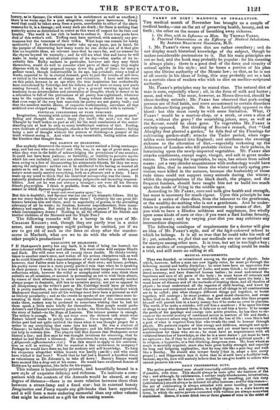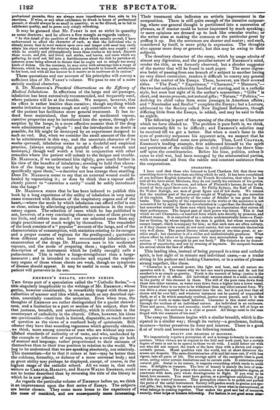PARRY ON DIET : MADDOCK ON INHALATION. THE medical month
of November has brought us a couple of medical books,—one on the art of preserving health, beauty, and so forth ; the other on the means of breathing away sickness.
1. On Diet, with its Influence on Man. By T_HOMAS PARRY. 2. Practical Observations on the Efficacy of Medical Inhalations-. By ALFRED BEAUMONT ManDockt, 1. Mr. PARRY'S views upon diet are rather crotchety ; and do not display much historical knowledge of the subject, though he makes considerable pretensions to it. But his main principles are not so had, and the book may probably be popular : for his meaning is always plain ; there is a good deal of the force and vivacity of animal spirits in his style ; and he bases a portion of his plats upon the Divine authority of the Mosaic law ; so that, as he is not at all ascetic in his ideas of living, this may probably act as a bait to a certain class of readers who wish to diet on medico-scriptural authority.
Mr. PARRY'S principles may be stated thus. The natural diet of man is corn, especially wheat ; oil, in the form of milk and butter ; meat, and wine. The meat, however, as Moses directed, should be clean-feeding animals : Mr. PARRY has observed that pork-eating persons are of foul habit, and more accustomed to certain disorders than delicate-living people. He is also Levitically opposed to the blood : but this must surely be with sotne limitation. What, 0 PARRY! would be a mutton-chop, or a steak, or even a slice of roast, without the gravy ? the nourishing juices, man, as well as the flavour, would be clean gone. To vegetables Mr. PARRY is entirely opposed. Not thinking of BACON'S remark, that "God Almighty first planted a garden," he falls foul of the Flemings for cultivating garden-stuff; attacks the Tudor period, when vege- tables were introduced into England; and attributes the sweating sickness to the alteration of diet,—especially reckoning up the Aldermen of London who fell probable victims to their palates, in luxuriating upon the newly-imported vegetables. Mr. PARRY also attacks condiments, except sugar, vinegar, and salt in great mode- ration. The craving for vegetables, he says, has arisen from salted meats: yet a very slender acquaintance with archaology would have taught hint, that in ancient times the winter and early spring pro- visions were killed in the autumn, because the husbandry of those rude times could not support many animals during the winter; whilst the depopulations of the black death, the plague, and the frequent famines, should have taught him not to build too much upon the mode of living in the middle ages. According to Mr. PARRY, corn and milk give health and strength, but meat is necessary for much vigour. Upon this principle ho has framed a series of class-diets, from the labourer to the gentleman, or the wealthy do-nothing who is not a gentleman. And he under- takes to produce an individual temperament by means of diet. If you wish to have a Ilindoo mildness and suppleness, live wholly upon some kinds of corn or rice; if you want a Red Indian ferocity, live upon meat ; and by varying your diet you may cultivate any intermediate disposition. The following catalogue of requirements for a doctor will give an idea of Mr. PARRY'S style, and of the high-coloured school to which he belongs. It is all so true that he could take his oath of it ; yet, somehow, we feel that our medicals are not so marked out for martyrs among other men. It is true, but set in too high a key ; a mere artifice of composition, by which any calling could be made a trial, and still more no calling at all.
MEDICAL REQUIREMENTS.
Thus was founded, or reinstituted among us, the practise of physic. Into which, however, before a man can now legally enter, he must go through the following mental and bodily discipline : he must have been an apprentice five years ; he must have a knowledge of Latin, and some Greek ; he must under- stand anatomy, and have dissected human bodies ; he must understand the functions and uses of all parts of the body ; he must know all minerals and salts, and everything which can be swallowed, or rubbed upon the body ; he must know all diseases and all the methods of treating them, and all theories of physic ; he must understand all the vagaries of child-bearing, and know by what names and compound names all elements of all things in all combinations are to be called ; also what changes different things put together, or burnt together, will undergo ; he must produce a good moral character, and swear before God to do welL After all this, that law which made him thus prepare himself will punish him in a heavy money-fine if he make an error in practice. The world, if he make a mistake, will call him a murderer ; if he spare his time or drugs to any who demand them, it fails not to call him a brute. If he escape the perils of his pupilage and emerge into active practice, he has then to en- counter the mental anxiety of continued action in matters of life and death ; to bear whatever odious may be connected with the loss of life : even this is but a part of what is required from him who treads the road to honour through physic. His patients require of him energy and mildness, strength and sym- pathizing weakness ; he must not be nervous, and yet must have an exquisite sensitiveness for those who are so ; he must have an acquaintance with all collateral branches of knowledge, or else he is a mere doctor : yet must he have no opinions ; for, if they be in politics, he will be termed a political quack ; if in religion, a hypocrite, or a free-thinking, dangerous man. He, from whom so much is mentally required, must also have great bodily strength and capacity for long and fatiguing application, that he may ride like a post-boy and walk like a Barclay. Ile should also temper finely [that is, adopt a diet nicely proper] ; and Hippocrates lays it down that he should have a healthful look, because, says he, men will scarcely believe that he can give health to others who cannot preserve his own.
DAILY PROFESSIONAL DUTY.
The active professional man should invariably exhilarate daily, and always, if possible, with wine. This should always be done after the business. of the day ; and althou intoxication,
nor by exhilaration, I neither imply drunkenness,
nor any approach to the known term muddling, or maudling, yet this duty (exhilaration) should always be deferred till after business: and for this reason— the act of exhilarating is always attended with some bustling or increased activity of the blood ; and approaches, in a slight degree, to a state known as fever, in which the active powers connected with volition are always somewhat diminished. Hence, if a man drink two or three glasses of wine in the midst at
professional pursuits, they are always more impediments than aids to his exertions. If wine, or any other exhilarant, be drunk in hours of professional pursuit, it should always be so small in quantity, or so far diluted, as to fail in exhilarant quality, and to prove only simply refreshing.
It may be guessed that Mr. PARRY is not so strict in quantity as some doctors ; and he allows a free margin as regards variety. " In this detail of the qualities of those dishes which usually prevail, I have endeavoured to afford the character of each, so that the individual who is already aware that he must sustain upon corn and temper with meat may easily attain his object amidst the dainties which a plentiful table may supply ; and while he steadily and philosophically bears these truths in his mind, discards those meats, and fish, and Mood, and stalks, and leaves, and roots which are polluting, be need not fall into a fastidiousness about the dish he partakes of, common sense being allowed to dictate that he ought not to mingle too many kinds of dishes. On the contrary, he may enter with advantage into a range of flavours, which he may pursue with pleasure and benefit to himself, satisfaction to his host, and with all due honour to le maitre or la mattresse de la cuisine."
These quotations and our account of his principles will convey a sufficient idea of Mr. PARRY'S volume. We pass to one of a more strictly medical character, 2. Dr. Msnuoce.'s Practical Observations on the Efficacy of Medical Inhalations. In affections of the lungs and air passages, inhalation has been extensively recommended, and frequently used, where patients will be at the trouble. We suspect, however, that its effect is rather lenitive than curative; though anything which soothe irritation or lessens cough not only contributes to the ease of the patient but facilitates more general treatment. It has in- deed been maintained, that by means of medicated vapour, curative properties may be introduced into the system, through ab- sorption by the lungs, in a more effective manner than if the drug were administered as " physic " : and the introduction no doubt is possible, for life might be destroyed by an experiment designed to such an end. But, when we consider the small amount of the dose to be administered in this way, and the uncertain character of its modus operandi, inhalation seems to us a doubtful and empirical practice, (always excepting the grateful effects of warmth and moisture,) though well worth a trial in conjunction with other remedies where the patient will submit to the fatigue and trouble. Dr. MADDOCK, if we understand him rightly, goes much further in his view of the benefits of inhalation ; seeming to hold that ulcera- tion of the lungs may be cured by the vapour inhaled "acting specifically upon them,"—a doctrine not less strange than startling. Does Dr. MADDOCK mean to say that an external wound could be healed by vapourizing it ; or does he think that a vapour suffi- ciently potent to "cauterize a cavity" could be safely introduced into the lungs ?
Dr. MADDOCK states that he has been induced to publish this book by a long experience of the utility of inhalation in very many cases connected with diseases of the respiratory organs and of the heart,—where the mode by which inhalation can afford relief is not so clear, unless by alleviating sympathetic uneasiness in the respi- ratory organs. The selection of cases which he has published is not, however, of a very convincing character; some of them proving too little, and others too much : nor are selected cases from any single practitioner of much weight by themselves. The remainder of the book consists of a" popular" account of the lungs, and of the characteristics of consumption, with statistics relating to its ravages and a proper course of regimen for the predisposed ; quotations from different authors who have recommended inhalation ; an enumeration of the drugs Dr. MADDOCK uses in his medicated vapours, and the mode of preparing them ; together with the description of an instrument which he (oddly enough) calls a pulmometer. This is rather a lungs-strengthener than a lungs- measurer ; and is intended to exercise and expand the respira- tory organs of those whose chests are weak, though no symptoms of disease should appear. It may be useful in some cases, if the patient will persevere in its use.



























 Previous page
Previous page